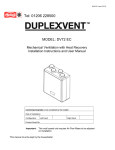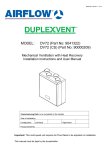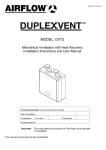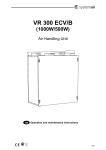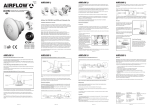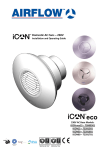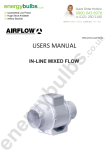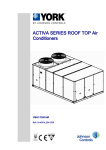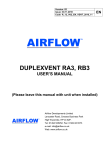Download User Instructions
Transcript
MODEL: BV400 Part No: 90000312 Mechanical Ventilation with Heat Recovery User and Maintenance Manual PLEASE RETAIN THESE INSTRUCTIONS WITH THE PRODUCT Page 2 of 18 INDEX 1. Introduction................................................................................................................ 4 2. Why Ventilate?........................................................................................................... 4 3. How Does A Ventilation System With Heat Recovery Work?................................ 5 4. Components............................................................................................................... 6 5. Technical Data............................................................................................................ 6 6. Performance Curve.................................................................................................... 7 7. Sound Curve............................................................................................................... 7 8. Dimensions................................................................................................................. 8 9. Operating Instructions.............................................................................................. 9 9.1 Basic Control Settings.................................................................................. 10 9.2 Fan Speed Adjustment................................................................................. 10 9.3 Other Control Functions............................................................................... 11 10. Maintenance Instructions........................................................................................ 14 10.1 Filter Maintenance...................................................................................... 14 10.2 Heat Exchanger Maintenance.................................................................... 15 10.3 Other Maintenance Procedures................................................................. 16 11. Accessories.............................................................................................................. 16 12. Troubleshooting....................................................................................................... 17 13. Warranty.................................................................................................................... 18 Page 3 of 18 1. Introduction Dear Customer, Thank you for choosing a Duplexvent Mechanical Ventilation with Heat Recovery (MVHR) unit. The balanced heat recovery ventilation unit Duplexvent BV400 has a state of the art design and must be used according to the planning calculations and operating instructions. Please read the information in the user manual carefully before you start using your equipment. In this document you will find instructions for usage and maintenance which are necessary to operate your unit properly and improve the longevity of your ventilation unit. This manual is intended for qualified installers and users of this unit. If you have any further questions, please contact: Airflow Developments Limited Aidelle House, Lancaster Road, Cressex Business Park High Wycombe, Buckinghamshire, HP12 3QP United Kingdom Tel: (Int +44) (UK 0) 1494 560800 Fax: (Int +44) (UK 0) 1494 461073 E-mail: [email protected] Visit: www.airflow.com Please keep this manual in a place where it is accessible at all times. In case of loss of this document please refer to the relevant product page on our website. The manufacturer is not liable for damage caused by unprofessional installation and operation that is not in compliance with this manual. Failure to follow these instructions may cause the loss of product warranty. Electrical Connection Danger Electric Shock risk Caution: Before opening the door of the unit for cleaning, filter replacement or general maintenance always make sure that the equipment is isolated or disconnected from the power supply. 2. Why Ventilate? With ever increasing energy costs the need to conserve heat and power is leading to higher levels of insulation and air tightness in residential dwellings and commercial buildings which inevitably leads to poor indoor air quality. In a healthy home, thousands of litres of fresh air are needed every day to replace the moist air generated by individuals and also through cooking, washing and bathing (please refer to UK Building Regulations, Approved Document F for guidance). Page 4 of 18 Ventilation is necessary to provide a healthy and comfortable internal environment for a building's occupants. The main task of ventilation is to remove polluted indoor air from a building and replace it with fresh outdoor air. 3. How Does A Ventilation System With Heat Recovery Work? Heat Recovery is a process of continuously heating incoming fresh air, by using the heat energy from outgoing stale, warm air and transferring a percentage of it to the incoming fresh air. This is accomplished by passing the incoming and outgoing air through a highly efficient heat exchanger. At no time do the airstreams mix as the heat radiates through plates of the heat exchanger, so no odour issues are possible. Extract Air Stale air is contaminated with humidity and odours which are extracted from the kitchen, bathroom, toilet, en-suite and utility rooms. Extraction vents in wet room areas allow a constant air volume to be extracted. This is backed up by a boost facility, removing stale air at a higher rate for a short period of time. Supply Air Fresh oxygenated air from outside passes through the filter and heat exchanger before being supplied into bedrooms, living and dining rooms etc. This fresh air is drawn into the various wetrooms collecting pollutants on its way such as moisture, odours, allergens and volatile organic components. The air is also heated as it passes from room to room using the statutory gap at the bottom of internal doors when closed. The now stale, polluted air is then drawn out of wet rooms through the heat recovery unit to outside, completing the cycle. 1 2 4 3 1 Extracted Air: bathroom, en-suite, toilet, utility and kitchen 2 Fresh Air from Outside: bedroom, living-room and dining-room 5 Page 5 of 18 3 Stale Air to Outside 4 Incoming Fresh Air 5 Heat Recovery Unit 4. Components 1 2 5 3 1 Control Box 2 Extract & Supply Air Filters 3 By-pass Module 4 Heat Exchanger 5 Metal Casing 6 Extract & Supply Air Fans 4 6 5. Technical Data EC Fan Speed settings selected on installation (Low & High speed levels are 100% adjustable) Typical Ventilation Settings at 100 Pa Rated Voltage Low Medium High Boost 75 m³/hr 200 m³/hr 350 m³/hr 425 m³/hr 3.0 V 5.5 V 8.0 V 10.0 V Maximum Air Volume (at 0 Pa) 475 m³/hr (132 l/s) Air Volume (at 100 Pa) 425 m³/hr (118 l/s) Thermal Efficiency (ref. SAP Appendix Q) 93% Specific Fan Power (ref. SAP Appendix Q) 0.45 W/l/s Power Supply 230V / 1PH / 50Hz Maximum Power Input 180 W Maximum Current 1.54 Amp Filter Class (conforming to EN779) G4 (F7 optional) Duct Connection Ø 160 mm Condensate Discharge Ø 22 mm Protection Class IP44 Operating Temperature -10°C to +40°C Operating Humidity 0% to 80% RH Dimensions (W x H x D) 710 x 725 x 630 mm Weight 41 kg Page 6 of 18 6. Performance Curve 500 450 External Pressure (Pa) 400 350 Low Speed Medium Speed High Speed Boost 300 250 200 150 100 50 0 0 50 100 150 200 250 300 350 400 450 500 550 Air Volume (m³/h) 7. Sound Curve Octave Sound Pressure Level (dB: Overall A Scale ) dB(A) 60 50 NR50 Low Speed Medium Speed High Speed Boost 40 NR40 30 NR30 NR20 20 NR0 10 63 125 250 NR10 500 1000 2000 4000 8000 Central Frequency (Cycle per Second) Page 7 of 18 Hz 8. Dimensions Front View Top View 160 Rear 475 103 287 610 630 10 725 733 731 116 23 130 710 Front Service Space Front View Top View Rear Front min. 110 mm. A clear space of 600mm should be provided in front of the unit to allow for servicing. Clearance for condensate drain *All dimensions are in mm. Page 8 of 18 9. Operating Instructions Continuous ventilation is necessary to ensure a healthy indoor air quality and to maintain the building fabric in good condition at all times. Even with prolonged absence of residents (ie. holiday) it is not recommended to switch off the ventilation unit since indoor contaminants are still being produced and entering the air, causing the air to get stuffy and a high possibility of moisture damage due to excess humidity during the heating season. Do not turn off the device! This is required for protection against moisture in accordance with DIN 1946 Part 6 and Building Regulations 2010 Approved Document Part F. The ventilation unit works properly when the flow rates are adjusted in accordance with the above regulations to ensure optimum ventilation of the house. Default Factory Settings Parameters Settings Low Speed Supply/Extract 30% (3V) Medium Speed Supply/Extract 55% (5.5V) High Speed Supply/Extract 80% (8V) Boost Speed Supply/Extract* 100% (10V) Manual Boost Overrun* 15 min On-demand Boost Delay* 1 min Filter Timer* 3000 hours Requested Indoor Temperature* 22°C Indoor Temperature Selection* Extract Air Temperature -3°C Defrost Temperature* Defrost Cycle* 15 min Pre-heater Temperature* 0°C Note: The low and high speed levels can be adjusted by manual potentiometers. The medium speed has been set in the controller's software by the manufacturer and is set as the average value of the manually adjusted low and high speed levels. * These values are factory set and can only be adjusted via the digital controller (BV400 SE). Page 9 of 18 9.1 Basic Control Settings ON/OFF: Press for 3 seconds. Press to increase fan speed. Press to decrease fan speed. Press to activate the manual “boost” function. Child Proof Protection: To activate this function, press and simultaneously for 3 seconds. When child proof protection is active, keypad is locked and buttons do not work. To deactivate this function press and for 3 seconds. 9.2 Fan Speed Adjustment The installer is responsible for setting the required air volume rates for every room in compliance with the Domestic Ventilation Compliance Guide 2010. The Duplexvent BV400 unit has a 3-speed control switch which is supplied as standard. The low and high speed levels can be adjusted by manual potentiometers for commissioning purposes. This can be done through the control box which is located on top of the unit. The medium speed has been set in the controller's software by the manufacturer and is set as the average value of the manually adjusted low and high speed levels. Page 10 of 18 9.3 Other Control Functions Boost Function This function is used when large amounts of exhaust and fresh air are required. There are 2 different boost functions (Manual and On-demand): a) The Manual Boost function is activated after pressing the “Boost” button on the control panel Once activated, the unit runs at the boost speed for 15 minutes. Note: During the manual boost operation the Low, Medium and High speed LED lights flash at the same time. b)The On-demand Boost function is activated via volt-free or switched live contact (see section 11) on the control board. When activated, the unit starts running at the “High” speed until it is deactivated and goes back to the speed level that was set before the boost operation. Volt-free connection for boost Switched live connection for boost Summer Bypass The Duplexvent BV400 unit is fitted with a bypass facility as standard. This can be used for keeping indoor air temperature at a comfortable level. If the house indoor air temperature is hotter than the unit temperature sensor setting (factory set at 22°C), with the incoming air temperature lower than the indoor air temperature, the bypass damper will open. This will tend to lower the indoor air temperature until it reaches the set temperature level (22°C). Page 11 of 18 At other times the unit will recover heat as long as the related dip switch in the control box is activated. The bypass function is activated from “dip switch 1” in the control box on top of the unit. ON CEY 1 2 3 4 This can be switched off in the heating season to have heat recovery at all times. Frost Protection In case of very low outside temperatures, the supply fan will reduce its speed automatically for a short period to protect the heat exchanger from freezing. This function is active when the outdoor air temperature falls below -3°C. For uninterrupted air supply and extract volumes in regions with low outside temperatures (< -5°C for more than 24 hours), an in-line electric pre-heater (see section 11) can be used in the supply air stream from the outside to the dwelling to avoid the heat exchanger freezing. The heater automatically switches on when the outdoor air temperature falls below 0°C. Once installed, the pre-heater control must be activated from “dip switch 2” in the control box on top of the unit. Filter Maintenance Indicator The unit is fitted with a maintenance reminder facility which has been pre-set to 4 months. When this time interval is reached the red warning light on the control panel flashes for filter maintenance indication. After cleaning/replacing the filters press the and buttons simultaneously for 3 seconds to reset the timer. Alternatively, optional pressure sensors (see section 11) can be used to measure the actual pressure difference between supply and exhaust air hence monitor the filter status. The red warning light on the control panel flashes as soon as the filters need to be maintained. After cleaning/replacing the filters, the red warning light goes off automatically. Page 12 of 18 Electric Post-heater For most of the year, heat recovered from the extracted air is sufficient to warm the fresh incoming air to the required temperature. If the heat gain from the extract air is not sufficient an optional post-heater (see section 11) can be used to increase the indoor air temperature. The heater is switched on/off automatically based on the extract air temperature in order to maintain the requested indoor air temperature (factory set at 22°C). Once installed, the post-heater control must be activated from the “dip switch 3” in the control box on top of the unit. Fire Switch This volt-free contact can be used to shut down the unit in case of a fire or any other emergency. A volt-free switch should be connected to the corresponding socket to activate this function. MODBUS Control / MODBUS Monitor The MODBUS (via RS485) BMS control function helps to control the functions from a central automation system. For more information, please contact our technical support team. The MODBUS BMS monitoring enables the user to display the operating status of the unit and receive fault signals (as different voltage outputs) in an unexpected failure of the unit. This function is activated from “dip switch 4” in the control box on top of the unit. Page 13 of 18 10. Maintenance Instructions Heat recovery units, by their very nature, require regular maintenance. The Duplexvent BV400 has been designed to facilitate easy access to enable maintenance to be carried out. Note: The heat exchanger will be damaged if the unit runs without the filters. WARNING THE FAN AND ANCILLARY CONTROL EQUIPMENT MUST BE ISOLATED FROM THE POWER SUPPLY DURING MAINTENANCE. Danger Electric Shock risk 10.1 Filter Maintenance In the Duplexvent BV400, both supply and exhaust air streams are filtered through G4 class course filters. The filters should always be kept in place when the ventilation unit is in operation. To prevent the contamination of this ventilation system, to guarantee years of trouble-free operation and ensure that clean air is supplied into your home the filters must be periodically cleaned or replaced (depending on contamination of the outdoor air). Step 1: Slide the service cover to the left, open it and remove the filters. Slide the Service Cover Left Open the Service Cover Remove the Filters Step 2: Use a vacuum cleaner to clean the dust from the air filter. If necessary, use warm water with detergent to remove the persistent dirt. Leave the filters to dry before placing them back in the unit. Vacuum Cleaner Page 14 of 18 Filter Note: The G4 filters should be replaced once every six months or after a maximum of two cleaning cycles. If an optional F7 filter is used please replace these filters after every maintenance cycle (replacement filters are available on www.airflow.com, see page 15 for part numbers). Step 3: Place the filters in the filter slots, close the service cover and slide it to the right to secure. 10.2 Heat Exchanger Maintenance Approximately every two years it is recommended that the heat exchanger is checked for contamination. This time scale may vary depending on the surroundings of the property. Inspection should be carried out when checking the filters. WARNING THE FAN AND ANCILLARY CONTROL EQUIPMENT MUST BE ISOLATED FROM THE POWER SUPPLY DURING MAINTENANCE. Danger Electric Shock risk Step 1: Remove the front cover plate and the bypass module by unscrewing the screws. Step 2: Remove the filters and pull the heat exchanger out gently using the green strap. Caution: The fins of the heat exchanger are very thin and can easily be damaged. Page 15 of 18 Step 3: Remove the dirt from the outside walls of the heat exchanger with a vacuum cleaner. Vacuum Cleaner Caution: Never use water or any other cleaning materials. 10.3 Other Maintenance Procedures During maintenance work in autumn please check the condensate drain is secure and not clogged. This can be tested by pouring some water into the drain pan and checking the water coming out of the unit through the condensate drain. Clean the drain, if necessary. Also ensure that the insulation of the condensate pipe is adequate. Check that the unit and all wall-mount fastenings are sufficiently tight and have not become loose. Re-tighten if necessary. 11. Accessories The following accessories for this unit can be ordered from Airflow Developments Ltd: Part Number Product Description 90000336 Digital control display 90000322 G4 filter pack (2 filters) 90000323 F7 filter pack (2 filters) 90000228 Boost switch (1-way) 90000324 Electric duct heater (1 kW) (can be used as pre-heater or post-heater) 9041570 Room humidistat 51969702 PIR Motion sensor 90000325 Built-in humidity sensor 90000326 Pressure sensors for filter monitoring Mechanical ventilation units require good quality ducting and a high standard of installation. To ensure the best results, we recommend the innovative AIRFLEX PRO semi-rigid ducting system. Page 16 of 18 12. Troubleshooting Diagnosing a Problem In the event of a problem, always troubleshoot the unit according to LED fault. There are two types of warnings displayed on the control switch: a) Red LED flashes on/off: Filter Maintenance Alert b) Red LED flashes continuously: Failure of Components (Fans, Sensors, Heaters) If no indications are displayed, then troubleshoot the problem according to the fault symptom as described in the table below: Failure Reason Outdoor air coming into * Air cools down in the attic ducts the dwelling is cold * The heat exchanger is frozen which is why extract air cannot heat the incoming air * The extract fan is not running * The extract air filter or the heat exchanger is clogged The unit has been switched off unexpectedly * Mains voltage failure The unit makes a lot of noise Gurgling noise * Condensate trap water level is too low * Condensate pipe is not completely in the trap * Condensate pipe or condensate trap is blocked or frozen Rumbling/Rattling noise * Fan motor fault Solution Check the duct insulation If the heat exchanger is frozen contact your supplier/installer to reduce the set point of the frost protection facility Contact your supplier/installer Check that the filters and the heat exchanger are clean Consult a qualified electrician to check mains power supply to units. Fill the condensate trap with water Push the pipe deeper into the trap Check the condensate drain and clean it, if necessary Contact your supplier/installer Water leakage near the * Condensate trap is clogged or frozen * Condensate pipe has come loose unit Check the condensate drain and clean it, if necessary Unpleasant smell near the unit * Condensate trap (U-bend) below the unit is empty * The condensate pipe is not completely in the trap * The condensate pipe or condensate trap is blocked or frozen Fill the condensate trap with water * Air extract rates are too low Activate the boost speed when cooking Replace the filters Clean all grilles Unpleasant cooking smell in the house * The filters are polluted/blocked * The grilles are dirty Too much condensation in the bathroom * Air extract rates are too low Page 17 of 18 Push the pipe deeper into the trap Check the condensate drain and clean it, if necessary Activate the boost speed while showering or bathing 13. Warranty Applicable to units installed and used in the United Kingdom. Airflow guarantees the Duplexvent BV400 units for 3 YEARS from date of purchase against faulty material or workmanship. To be aware of the latest updates of Duplexvent BV400, please register your product at www.airflow.com. The warranty only covers the unit, not the re-installation of it if required. In the event of any defective parts being found, Airflow Developments Ltd reserve the right to repair or at our discretion replace without charge provided that the unit: 1. Has been installed and used in accordance with the fitting and wiring instructions supplied with each unit. 2. Has not been connected to an unsuitable electrical supply. 3. Has not been subjected to misuse, neglect or damage. 4. Has not been modified or repaired by any person not authorised by Airflow Developments Ltd 5. Has been installed in accordance with latest Building Regulations and IEEE wiring regulations. 6. Has been installed by a competent person who is qualified to do so. Airflow Developments shall not be liable for any loss, injury or other consequential damage, in the event of a failure of the equipment or arising from, or in connection with, the equipment excepting only that nothing in this condition shall be construed as to exclude or restrict liability for negligence. All goods are sold according to Airflow Developments Limited's Standard Condition of Sale which is available on request. In the interest of continuous development Airflow Developments Limited continuously strive to improve their products and reserve the right to change specifications and prices without prior notice. This warranty does not in any way affect any statutory or other consumer rights. All information believed correct at time of going to press. 80000135 - Issue 1 5/13 REV01 15.07.2013 Page 18 of 18 95201074


















